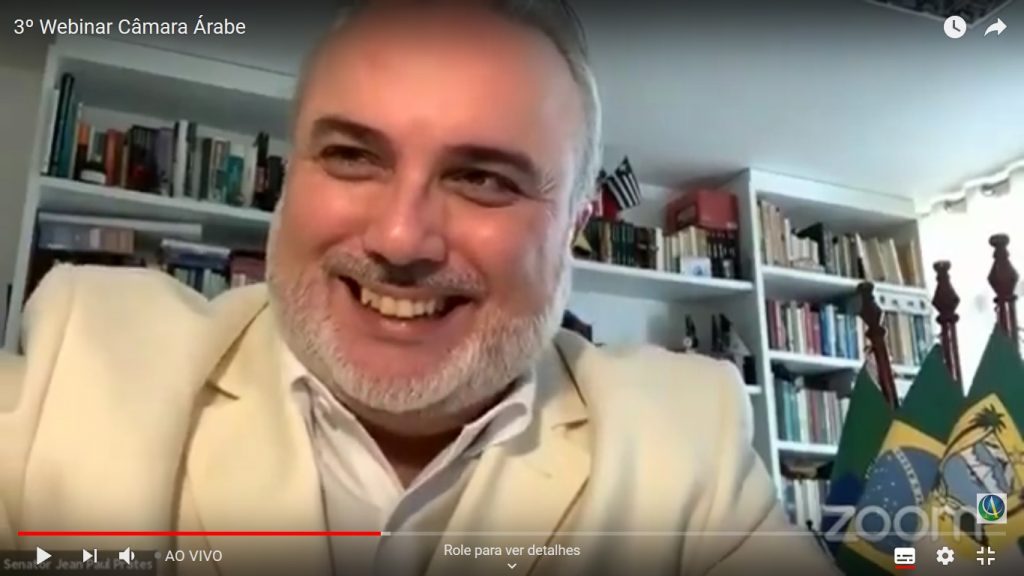São Paulo – The Brazil-Arab Countries Parliamentary Group was launched this Wednesday (29) during the webinar ‘Encouraging and developing Brazilian-Arab bilateral relations,’ hosted by the Arab Brazilian Chamber of Commerce in partnership with certifier Fambras Halal. The group’s chair (pictured above), senator Jean Paul Prates, said work will revolve around three pillars: trade, politics-diplomacy, and technical cooperation. He also stressed the relevance of partnership in the social and environmental fields, with Arab investment funds, and in the oil and gas market.
Senator Prates believes the biggest challenge facing the group is that of spearheading, within National Congress, the drive for an agenda that promotes relations in trade as well as politics and culture between the countries involved. “Brazilian-Arab relations are underpinned by three pillars. The pillar of trade, the pillar of politics-diplomacy, and your technical cooperation aspects. Brazil’s parliament is staying watchful of any actions from the Executive that might jeopardize the interests of relations with the countries that comprise this important diplomatic arc,” he said.
As far as the Group is concerned, trade is the most important pillar. “We purchase fertilizers, we purchase oil, that makes up 80% of our imports (from Arab countries). And then we export meat, poultry, maize, cane sugar, iron ore and other important items,” said the senator. According to him, Arab countries are a key gateway to other Muslim markets in Africa, the Middle East and Asia.
As for investment opportunities in Brazil, he said technology, agriculture and public=-private partnerships (PPPs) have proven to be options for the Arabs. “Brazil is an interesting terrain for investment in these fields. We have a lot of shortcomings, and we have relatively well-regulated infrastructure and energy sectors, with very solid regulatory frameworks in place,” he said.
The senator said Brazil has the potential to develop and become established as a global leader in green economy. Prates mentioned the country’s production capacity, its ability to spread technical knowledge, its managing of agriculture and biodiversity, and the development and production methodology for halal products, which he said goes hand in hand with sustainable manufacturing. “Halal product is sustainable product, and the Muslim market is an open door for Brazil to explore and increase its exports,” he said. He also warned that sustaining good diplomatic relations is key as competition grows stronger around the world. “There are potential competitors in this market in Australia, the United States, Argentina and Paraguay.”
The second pillar is politics-diplomacy. “It is known that the incumbent administration has at times threatened or undermined the excellent relations cultivated over the last few years, with occasional politically incorrect stances and statements. Congress needs to be vigilant of the Executive’s behavior, precisely so we can sustain these good relations in culture, trade and politics. Congress can enhance countries’ relations at the parliamentary level, by creating new levels of cooperation and relations and enhancing existing ones,” he said.
The third pillar is about technical cooperation. “We can even cooperate regarding Covid-19, in the development of vaccines, treatments, medicines, personal protective equipment and so forth,” he said. Prates also said the countries can partner up to improve usage of the products that they trade, developing new technologies in fossil fuels, agriculture, fertilizers, etc.
The senator also went over socioenvironmental partnerships, specifically for irrigation projects in Northeast Brazil and the facilitation of exports by smallholder farmers.
He discussed the consequences of the pandemic to the oil and gas industry, international tourism and Arab investment funds, as well as the importance of educational and cultural exchange. “These are the goals of the Parliamentary Group: the voting of legislative matters advantageous to Brazilian-Arab relations. This interchange is very important, because it also brings civil society entities, public and private institutions into the debate. And we can never forget culture and the arts, which are extremely important and cannot be left out to dry, especially right now, since arts and crafts professionals have temporarily lost their livelihoods,” he said.
Group vice-president and federal congresswoman Angela Amin was also in the webinar. She said the Group’s role is to find and put to vote legislative matters, acting as a facilitator of a mutually beneficial agenda. Mrs. Amin stressed the relevance of agribusiness, food security, logistics, strategic partnerships, the sharing of knowledge and culture, and necessary investments among the countries. “So that we can enhance our exchange and so that we can all win, in every sense, with the changes that are needed as a result of the analysis of the pandemic,” she said.
The webinar had over 800 viewers, not only in Brazil and the Arab countries, but also across the Americas, Africa, Europe and Asia, and from the public and private sectors. “Covid-19 is showing us that even though we have new technologies being discovered and created each day, we must work for a more and more humane future. We must discuss, plan and build public policies, partnerships and actions in tandem,” said Arab Chamber president Rubens Hannun as he kicked off the online event.
Hannun believes the creation of the parliamentary group is of the utmost importance. “There is a lot of work to do to build even tighter relations in trade, society and culture. Key areas include cutting down paperwork requirements in foreign trade, eliminating customs barriers, and reaching trade agreements between the Mercosur block and the Arab countries. We have a great example already in place, which is the Mercosur-Egypt free trade agreement, and talks are ongoing for other agreements, like the one with Palestine, Lebanon and Tunisia,” he said.
Fambras Halal president Mohamed Zoghbi, who was also a speaker in the webinar, said Brazil’s 50-year old halal industry is one of the most reliable in the world. “We have invested heavily in order to remain at the cutting-edge of certification. We have the best halal in the world, even though we are not an Islamic country. We’ve been working for over 50 years to achieve the respect, the reliability and the food safety legislation,” he said. He discussed the importance of food security and halal certification, as well as the idea of having a bank operate with Islamic finance in Brazil to secure more investment from Arab funds.
The webinar also featured Palestine ambassador to Brasília and Council of Arab Ambassadors in Brazil dean Ibrahim Alzeben. He said the Parliamentary Group will work to maintain and take care of relations. “Brazil has always sustained excellent relations with the Arab world. I am happy to say we are doing all we can to keep Brazilian-Arab relations alive,” he said. The webinar was moderated by Arab Chamber secretary-general Tamer Mansour. Speakers also included Arab Investors Award secretary-general Natheem Sabbah, and the Jordan Chamber of Commerce’s Jamal Fariz.
Numbers
Arab countries are Brazil’s third biggest export destination, trailing China and the United States. Last year, total trade between Brazil and the 22 Arab countries exceeded USD 19 billion – with just over USD 12 billion in goods shipped from Brazil and close to USD 7 billion shipped from Arab countries. “This trade, which largely revolves around commodities, means agribusiness is the centerpiece of relations. Products such as meats, sugar and grains are among the five most exported items to Arab countries. There is great potential for exchange in cosmetics, agricultural machinery, medical-hospital products, technology and innovation. Investments are also a strong suit of Arab people, especially in the Gulf countries. And Arab countries can also be considered strategic partners for the growth of Brazil’s economy in years to come,” said Hannun.
Click here to watch the full webinar
Translated by Gabriel Pomerancblum









